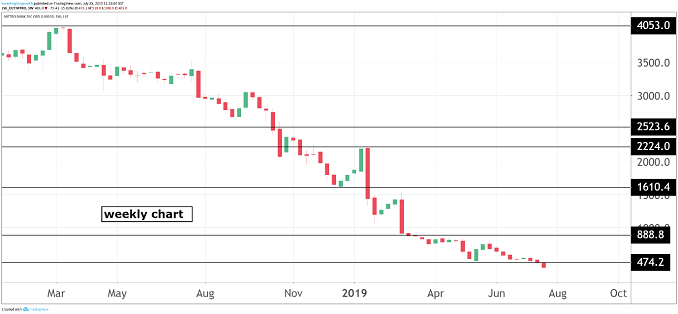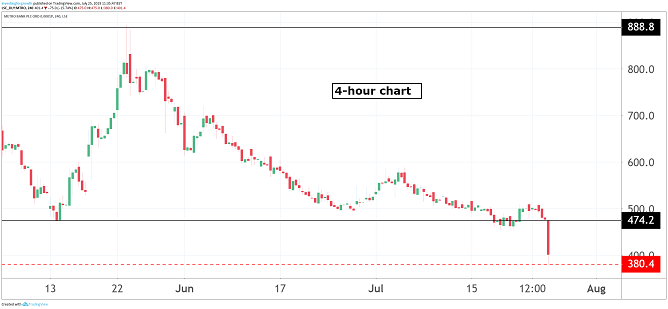Why Metro Bank just crashed 20% to new low
Releasing another set of results after the closing bell failed to protect shares from a fresh thumping.
25th July 2019 12:52
by Graeme Evans from interactive investor
Releasing another set of results after the closing bell failed to protect shares from a fresh thumping.

Exactly a year ago today Metro Bank (LSE:MTRO) announced it had successfully tapped new and existing shareholders for £303 million in a bid to support its "revolution in British banking".
The price of 3,422p will now make those backers wince, given Metro shares are trading at below 400p following a disastrous year for the high street lender, and one that's been richly rewarding for the many hedge funds shorting the FTSE 250 index stock.

Source: TradingView Past performance is not a guide to future performance
Last night's interim results laid bare the fall-out from Metro's difficulties, which follow January's discovery of a major accounting error where some commercial loans on its balance sheet were wrongly classified in risk terms.
This led to the need for a second fundraising in May so that the bank had sufficient capital to hold against these loans and to support future growth. Around £375 million was successfully raised at 500p a share in the placing, although "intense speculation" at about this time meant £2 billion of deposits were withdrawn over the first six months of the year.
These outflows were driven by "a limited number of commercial customers", with Metro pointing out today that the tide had turned in the past eight weeks after net deposit inflows of over £700 million.
Additional store openings in the second half of 2019 should bring full-year deposits broadly into line with December 2018 at £15.7 billion, but that's some way short of the group's medium-term target for deposit growth of 20% a year. In first-quarter results in early May, the bank's guidance had been for investors to expect a slower rate of deposit growth.
There's also concern about the impact of an ultra-competitive mortgage market on Metro's net interest margin, which declined to 1.62% from 1.85% a year earlier and has further weakened on a quarter-on-quarter basis. Statutory profits slid to £3.4 million from £20.8 million a year ago, with costs relating to the need for new processes and controls one factor.
The group's shares dived another 20% to 380p, in the wake of these results, published after the stock market had closed last night. Given that the fundraising at 500p was oversubscribed in May, how tempting will today’s latest fall make a stock that was trading at 4,000p only a year ago?

Source: TradingView Past performance is not a guide to future performance
Analysts at Jefferies and Morgan Stanley appear to think there's some recovery potential, based on price targets of 770p and 700p respectively.
Metro's customer account growth remains robust at 190,000 in the half year, with a 23% rise in personal accounts and 19% for business. The overall total number of accounts at 1.8 million meant fee and other income increased 61% to £46.4 million, with the quarter-on-quarter improvement being 7%.
Some of the City's questions over leadership have also been addressed by the decision to seek a new independent chairman to replace founder Vernon Hill.
In the 10 years since the bank arrived on the UK high street, the business has grown to an estate of 67 sites. Northern expansion is gathering pace with new stores being built in Manchester and Liverpool, while the first of Metro's Birmingham outlets opens in August in a bid to create a Midlands hub.
These articles are provided for information purposes only. Occasionally, an opinion about whether to buy or sell a specific investment may be provided by third parties. The content is not intended to be a personal recommendation to buy or sell any financial instrument or product, or to adopt any investment strategy as it is not provided based on an assessment of your investing knowledge and experience, your financial situation or your investment objectives. The value of your investments, and the income derived from them, may go down as well as up. You may not get back all the money that you invest. The investments referred to in this article may not be suitable for all investors, and if in doubt, an investor should seek advice from a qualified investment adviser.
Full performance can be found on the company or index summary page on the interactive investor website. Simply click on the company's or index name highlighted in the article.